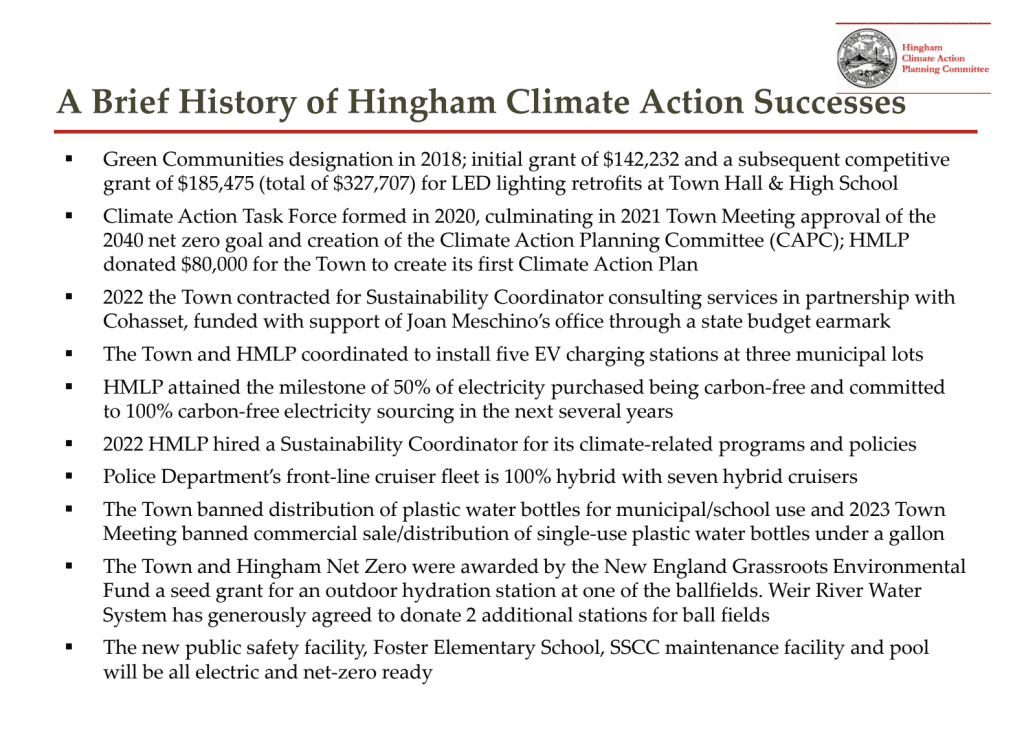
July 26, 2023 By Carol Britton Meyer
Hingham Climate Action Planning Committee Chair Brad Moyer presented to the Select Board this week an overview of its 145-page Climate Action Plan — the culmination of three years of hard work.
“This is an exciting moment for us,” he said. “Hingham is a leader in this area on the South Shore. Five years ago, I wouldn’t have anticipated that.”
Moyer explained the mission of the CAPC and its successor created by Town Meeting — the Climate Action Commission — gave a brief history of Hingham climate action successes, and also shared what the plan does and doesn’t do and its structure, including a carbon inventory.
The CAPC’s charge was to evaluate a wide range of carbon emission reduction strategies and to propose measures to achieve a zero sum of carbon emissions produced and taken out of the atmosphere (i.e., “net zero” carbon emissions) by the year 2040 or another target date deemed feasible.
The CAC’s role is to support, oversee, and report on the progress of the implementation of the town’s Climate Action Plan.
These efforts include:
- investigating the feasibility of new technologies and best practices as applied to
Hingham and to update the Climate Action Plan accordingly; - providing support to town committees and other municipal government entities as they work to act on recommendations to reduce carbon emissions;
- working with businesses, residents, and organizations in town to help educate, support, and encourage adoption of low-carbon and no-carbon technologies; and
- regularly disseminating information on the town’s progress toward Net Zero carbon emissions.
A survey to which there were 362 responses helped identify concerns and opportunities that the plan seeks to address. The CAPC also held 40 public meetings, three public engagement sessions, three Select Board presentations, and three presentations to other town entities along with making two presentations to community groups, holding two public events, and having three articles published.
Moyer also explained what the plan does and doesn’t do. “It doesn’t obligate anyone to anything, mandate budget expenditures, or supplant normal town and approval processes,” he said. “It’s a call to action, and what it does do is make recommendations and ask residents, businesses and non-profits, and town government to consider actions to reduce carbon emissions.”
The plan also recognizes economics and changes in technology and mandates continued refinement and growth. “It’s a living document, and we need to mind it and watch it,” Moyer said.
The plan is “deep, but accessible — it’s digestible,” he explained. He went on to explain how to review it and how to access the detailed recommendations, the body of the plan, and the carbon inventory containing a detailed analysis and list of assumptions as to how to calculate carbon emissions in the town, using the most recent data available from 2021.
The contours of the plan include electricity supply, buildings, transportation, waste, community outreach, air quality, and “public pathways,” natural resources including land conservation and management, and implementation.
The document also provides examples of potential grants and funding opportunities.
“I look forward to implementation of the plan and learning more about grant opportunities,” Select Board Chair Liz Klein said. “There’s a lot to digest.”
Select Board member Joseph Fisher said he’s impressed with the passion of the group of residents who comprise the committee and commission.
Climate change concerns brought up
Fellow board member William Ramsey asked about steps that could be taken to protect the town’s infrastructure from the impacts of sea level rise and other climate change threats.
“How are we going to protect our roadways and the downtown corridor, which are very much in jeopardy — including residences, businesses, and the sewer system?” he asked.
While how to reduce carbon emissions was the CAPC’s main charge, Moyer agreed this is an important issue.
CAPC member Henry Hidell agreed that protecting the infrastructure “is a big deal” and urged the formation of a long-range committee as soon as possible to begin addressing immediate needs and to identify short- and long-term issues. “We need to begin this process,” he said. “It can’t wait.”
Planning Board member Gary Tondorf-Dick praised Moyer for his leadership “of this talented group that studied this complex issue.”
Klein said she’s confident the plan will be implemented and that “it will not sit on a shelf.”

